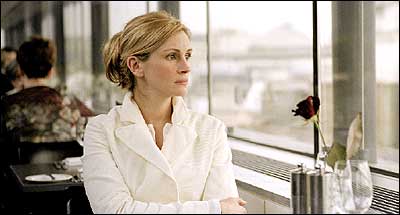
(Photo credit: Courtesy of Columbia Pictures)
The first time Jude Law’s Dan kisses Julia Roberts’s Anna in Closer, Roberts moves into their clinch with her eyes alert, as though searching her partner’s face for a desire equal to her character’s own. When the kiss is completed, Roberts pulls back and her eyes flutter once and glaze over just a little. In a few silent seconds, she’s conveyed Anna’s intense longing for a passion she’d all but given up on finding, and she’s almost literally stunned.
This is great movie-star acting, which I intend as a high compliment. For a celebrity as familiar as Roberts, it’s exceedingly difficult to surprise an audience, but I’ll bet you’re going to come away from Closer feeling you’ve seen sides of her talent she’s never been given the opportunity to reveal before now. Playing a shrewd, jaded photographer—the sort of artist who needs to use people as objects in her portraits and who turns herself off to them as people as well—Roberts denies us the sparkly glances and the endearing hoot of a laugh that have made her so winning in the past. As part of a vicious love quartet, she gives a ruthlessly spare performance that will rip at your heart if you’re willing to let her in there.
Yes, there are three other stars in Closer, directed by Mike Nichols and based on Patrick Marber’s hit play set primarily in London. There’s Law’s Dan, a self-pitying obituary writer; Clive Owen’s Larry, an arrogant physician; and Natalie Portman as Alice, a stripper who can convincingly refer to herself as a naïf. Marber’s play and his film adaptation of it have this foursome falling for each other in every combination except the homosexual one. The couples couple constantly, break up, and blurt things like “Men are crap” and “I love everything about you that hurts.”
Nichols is back, his instincts for intimacy as cutting as ever, to territory he mined in Carnal Knowledge and in another play turned movie, Who’s Afraid of Virginia Woolf? After the epic sprawl the director oversaw with last year’s Angels in America, Nichols takes a rootless, restless approach to predatory mating games. A mere change of scene can propel the drama months ahead in time, but we gather this only from a few stray lines of dialogue. It’s Nichols’s way of keeping us as off-kilter as his characters’ emotions are, yet the movie itself never wobbles or drifts the way oddball flops like What Planet Are You From? (2000) and Wolf (1994) did. The protagonists marry, divorce, cohabit, flee the country, or hunt each other down for one last mercy fornication—except that in Nichols and Marber’s cramped, damp universe, people are merciless and the fornicating is four-letter-word-humorless. There are bed scenes at once so wry and so despairing, they give new meaning to the phrase “dry humping.”
The minimalism of Marber’s dialogue and structure—there’s almost no one else in Closer except these four—certainly helps the director’s sleek rigor, but Nichols and his actors also redeem some of Marber’s occasionally stiff notions of conversation. Owen must muster all his frowsy, stubbled charm, for example, to toss off an aperçu such as “She has the moronic beauty of youth,” and I’m still not sure I wouldn’t just giggle if someone said that to me. Especially about Natalie Portman. Portman herself is wonderfully wounded and bitter. All that advance publicity about her randy men’s-club dancing scenes, how Nichols shot her nekkid but she doesn’t go-go all-nude here, just gets in the way of appreciating her true achievement: She’s angry and alluring even when she’s in nothing but a G-string and a pink wig.
As for the men, Law caps his ceaseless season of releases with the anti-Alfie: Law makes this guy’s desperate, vacillating love for both Anna and Alice the poignant dither of a sniveling conniver. Owen has a showier part than Law (Owen played Law’s part on the stage, so perhaps he knew better how to upstage his co-star), and his brute energy makes us enjoy nearly every one of Dr. Larry’s brash pronouncements about love and sex.
Closer is marred by some drippy music courtesy of Damien Rice and a small-surprise ending that feels like gimmicky irony. But the film’s core idea is compelling: The four lives that contort to become closer end up further apart, and in immense pain. The perpetual pursuit of love, when practiced by adults instead of adolescents, can lead to something worse than mere heartbreak: enduring heartache.

Hooray for Hollywood—um, Broadway. Closer is just the first of three plays to jump to the silver screen this winter. On December 24, John Madden’s adaptation of David Auburn’s Tony-winning Proof opens, with Gwyneth Paltrow reprising the part she played on the London stage (a role originated by Mary-Louise Parker): a genius mathematician’s grieving daughter. On the 22nd, Joel Schumacher opens Phantom of the Opera—the first big-screen version of the musical, though there have been many adaptations of the novel, including one that hilariously starred Nightmare on Elm Street’s Robert Englund (Freddy) as the Phantom.
Closer
Directed By Mike Nichols.
Columbia Pictures. R.